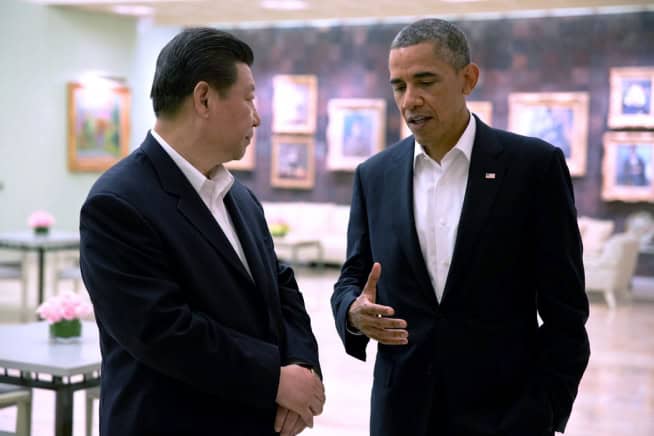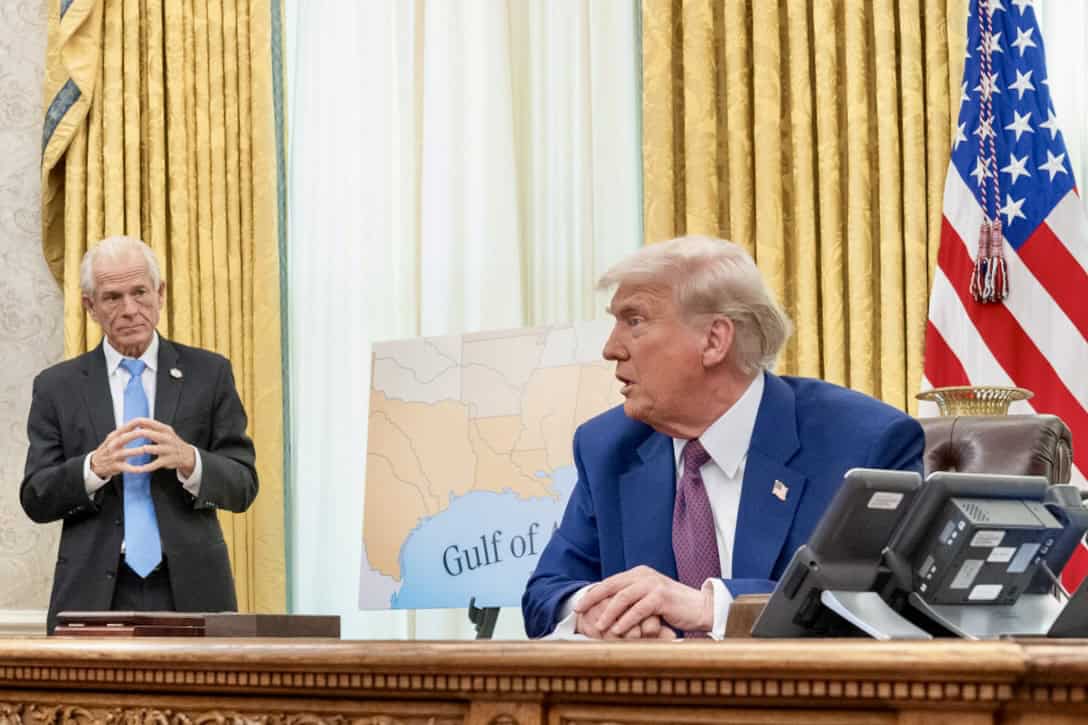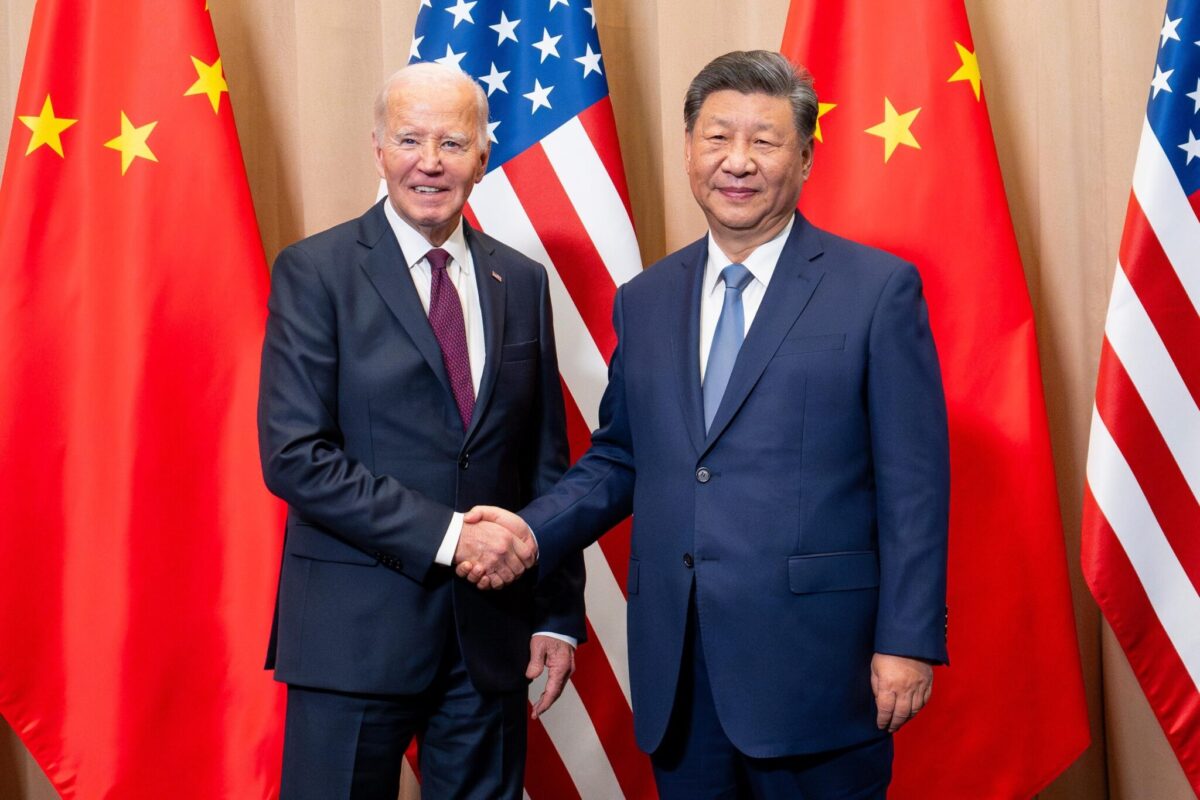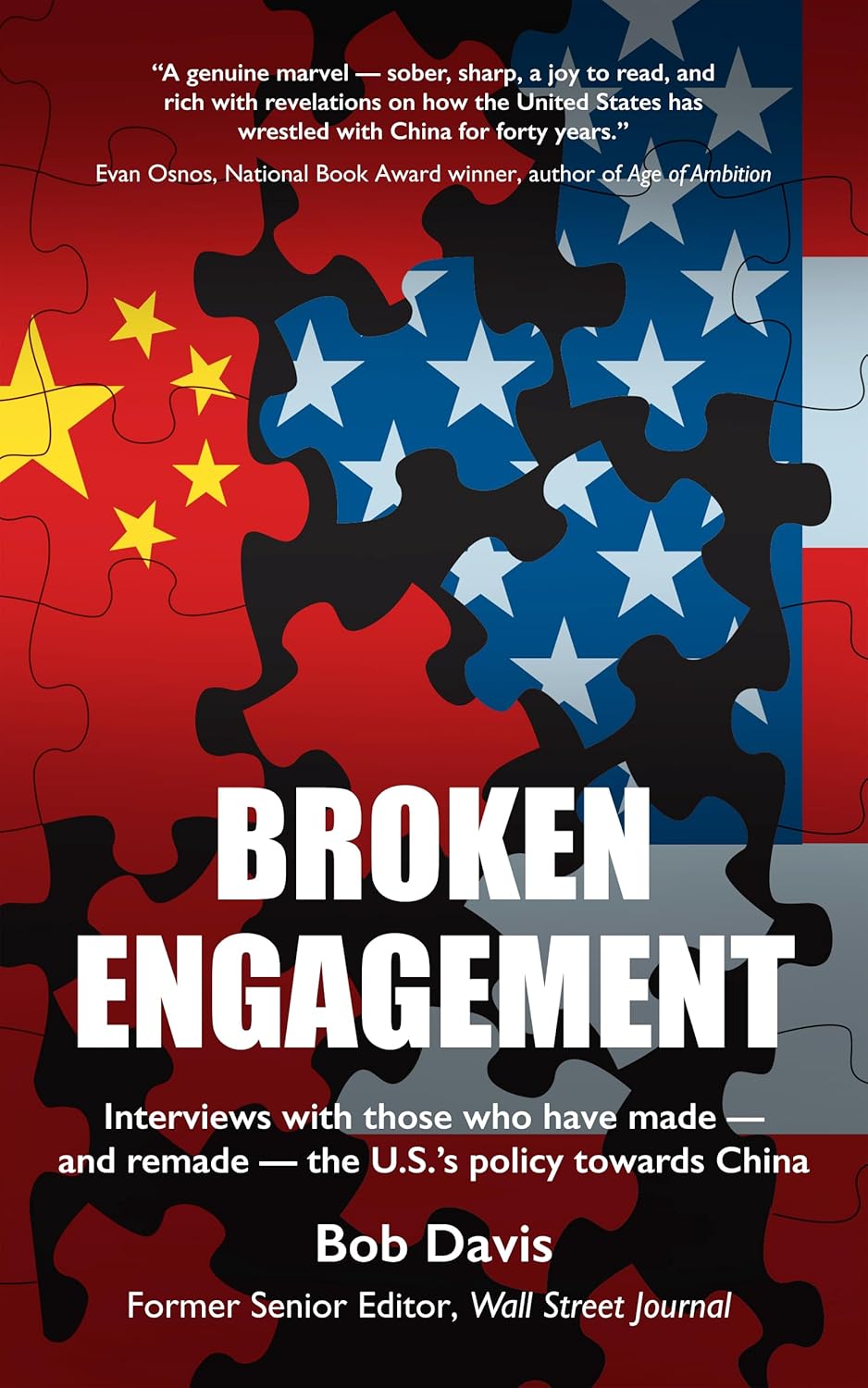Sign up for our newsletter to be notified of new posts!
Ed: We’re delighted to help announce the launch of Broken Engagement: Interviews with those who have made — and remade — the U.S.’s policy towards China (The Wire China, March 2025) — published by the team at our older sibling site The Wire China, a digital business magazine founded in 2020 by Pulitzer-prize winning journalist David Barboza. The e-book contains 26 interviews conducted by Bob Davis, former Beijing correspondent at The Wall Street Journal, with senior American policy maker who have shaped U.S. engagement (or lack of it) with China over the decades. From Nancy Pelosi to Nicholas Burns, the interviews are a roll-call of household names from right (Steve Bannon, Mike Pompeo) to left (Ash Carter, Gary Locke), covering administrations from George H.W. Bush to Joe Biden.
To celebrate publication, David Barboza turned the tables on Bob Davis to ask for his reflections on U.S. policy and policymakers, and what happens to the U.S.-China relationship now. Davis, who also co-authored Superpower Showdown (Harper Business, 2020) about the first Trump administration’s trade war with China, discusses shifting China policies, the end of engagement, and Trump’s new stance on China.
When you think back to the interviews that comprise the Broken Engagement book, what are your big takeaways?

The biggest takeaway, and the biggest overall surprise, is how much each of these administrations wrestled with the idea of engagement with China. How much time should they spend focusing on China? What could they expect from China? How do you play China? Do you try to get closer to China, or keep a distance from it? You see each of the interviewees wrestling with the rising challenge from this increasingly powerful country.
It’s interesting, as Robert Gates [Defense Secretary for both George W. Bush and Barack Obama] reminded me, that engagement didn’t start out [under the Nixon administration] as being about economics at all. It was all about the national security idea of trying to peel China away from Russia, to take advantage of the split that was obvious and growing between them back then. Gates even talked about how weird it was for him, as a CIA officer, to be wandering around Tiananmen Square in the 1970s, and to be coaching Chinese military officers on how to read Soviet telemetry.
Under George H.W. Bush the administration talked about economic engagement, really as a fig leaf, a way of masking his desire to continue relations with China. The Clinton administration clearly moved onto the idea of economic engagement in a very powerful way.
And so when the relationship started, China was very small in terms of its economy, and even its political and military power. But then each administration started to see China as a much bigger economic and strategic challenge.
The economy and national security are always interlinked; every administration recognizes that. But China wasn’t seen so much as a challenge at first. It was seen as an opportunity, with 1.4 billion clearly hardworking, energetic people making efforts to revive and revamp their economy.

Then the Clinton administration came in and made a real effort on human rights. Nancy Pelosi, who was probably the most fun interview of all, gives them zero credit for that. But I think they actually deserve credit for trying to push the Chinese to make some real concessions on human rights, to respect the rights of dissidents and to move on the rule of law. And they just said “No.” [Former Chinese premier] Li Peng in particular, when talking to Warren Christopher [Secretary of State under Bill Clinton], said “Why should I? I have Goldman Sachs coming in here all the time courting us. Why do I have to listen to you?” So Clinton was forced to give up on that — and then they moved very hard into the economic relationship.
I think people like Robert Rubin, Charlene Barshefky and Larry Summers — the Clinton economic team — always thought that the human rights effort was very unlikely to succeed. Rubin was very interesting in his interview with me. He said now he’s grown to understand more about how human rights are important. I asked him for examples and he basically came up with zero answers. I wound up thinking it was just the sort of thing a Democrat typically says, and that he still didn’t really think in terms of human rights. He thinks in terms of the economy, and that maybe that can help with human rights, but it’s way down in his calculations.
So under Clinton, they eventually negotiated the deal to get China into the WTO [World Trade Organization]. They saw it as an enormous opportunity and put some safeguards into that deal, although that is another point of discussion among the different people I’ve interviewed — whether those safeguards were significant. Clearly the rise of China, the speed at which it became an economic and export powerhouse, surprised them.
It is an amazing story. By the time Clinton’s term was over, the U.S. and China had a major economic relationship. That’s just over a decade after the Tiananmen Square crackdown in 1989. The Clinton administration seems to have been a turning point. China was opening up to foreign multinational companies, which were probably lobbying that this is an economic opportunity, and forget about human rights. Was that a big shift in the way the U.S. thought about China?
Definitely. For the business types, of course they were lobbying because it was a big opportunity. But they also thought that they were doing the right thing by increasing economic ties because they believed that would liberalize the economy and also the politics of China. It mattered for business people, just as human beings, to think that they were not just in there to make a buck, but that they were there to pursue policies and profits that would also help ordinary Chinese people.
In retrospect, that was clearly naive, but that was a good part of it as well.
If engagement is now dead or broken, what went wrong? Were there a couple of key moments that led to where we are today?
Here’s my take on it. The high point of the relationship was 2008-2009 during the global financial crisis. When the world was falling apart financially and economically, George W. Bush turned to Hu Jintao and convinced him to work with him at the G20. The Chinese clearly thought of stimulating their economy as being in their own interests too. They worked together and it made a gigantic difference in preventing the global recession from turning into a depression.
But at the same time, China began to feel cocky. The Americans were terrified that they were going to pull their money out of the U.S. and make things worse, and start to sell off their Freddie Mac and Fannie Mae bond holdings. And if you’re a Chinese technocrat, all of a sudden the U.S. model that you’ve been following, the model that you think is the exemplar of how to run your economy, doesn’t look so great anymore. So they started to experience the hubris that the United States often feels. You start to see the Chinese thinking that we don’t really have to follow these guys. They’re not the models that we thought they were.

The Obama administration was a big turning point. Barack Obama came in in 2009 with the financial crisis still going on. They needed China and appreciated what China had done economically. They also needed China to try to deal with North Korea, and to try to deal with the climate crisis.
But think back to the Rose Garden appearance of Obama and Xi Jinping in 2015, when Xi promised to curb cyber spying on U.S. companies, and promised not to militarize the South China Sea. The most amazing thing I heard during all the interviews was from Mike Rogers, the former head of the National Security Agency. He said that when it came to cyber spying, that pledge by Xi lasted six months. A promise made by the leader of the Chinese Communist Party and the Chinese government about backing off — and he backs off for just six months.
I asked Rogers, what did Obama do? Did you start cyber operations? He was not going to necessarily say everything the National Security Agency did, but basically his answer was “no,” that Obama’s view was that we had been able to deal with the Chinese in a background kind of way, and so let’s continue to do that. I think there’s a fair amount of regret from people who were in the Obama administration, some of whom went into the Biden administration, that they didn’t push back hard at that.
By the very end of the Obama administration, in 2015, they started blocking Chinese purchases of American chip companies. You start to see clearly the U.S. responding to what they see as a Chinese challenge. At the same time you have Xi Jinping consolidating power, with a much tougher attitude toward the U.S..
And then you get Donald Trump, who campaigned by saying that China was “raping” the U.S. economically. Trump deserves credit or blame, however you look at it, for changing ordinary people’s attitudes toward China. It has come to be seen more of an adversary and a threat than a potential partner. But even so, if you look at what he did in the first part of his administration, he cut a trade deal with China — a very traditional thing to do — which was celebrated at the White House in early 2019.
Covid then hit in 2020, just as they signed the deal. A number of people in that White House came to think that the Chinese knew that Covid was spreading and came to the deal signing anyway, and so literally became a health threat to the president of the United States and his senior officials. Clearly Covid was something that threatened the Trump presidency. As [former Trump deputy national security adviser] Matt Pottinger pointed out in his interview — and I think he is absolutely right — that was really the break when it came to engagement. March 16, 2020, was the day that Trump called Covid the “China virus” — and I think that is literally the day engagement died.
After that, you have Trump being very tough on China, then Biden essentially following on from what Trump did, albeit while trying to include allies. And I think that’s where we’re at now, where it’s just a debate about how much disengagement, and how much decoupling, do we do?
March 16, 2020, was the day that Trump called Covid the “China virus” — and I think that is literally the day engagement died.
Was this break inevitable? Is it right to say that once China got to the level of being a peer of the United States, at least in certain areas, there was always going to be a break regardless of U.S. administration, Republican or Democrat? Because this was the Chinese plan all along — while China was effectively rising, they would follow the rules that the U.S. had set up; but eventually they wanted to make their own rules, to be more dominant in Asia and so on. What do you make of that?
It’s clear that China would become a competitor to the U.S., in the same way Japan in the early 1990s seemed to be emerging as the number one competitor. The gigantic difference there though is that Japan was never a military challenge — they were always 100% dependent on the United States.
I don’t think nastiness and bitterness in the relationship was inevitable. But your question gets to things that we really don’t know. We’re always blaming or crediting ourselves: but to what degree was it always the plan of the Chinese, or of the Communist Party leaders, to bide their time and hide their strength, and to at some point challenge the U.S. for regional, if not global supremacy?

Rush Doshi [deputy senior director for China and Taiwan on the National Security Council under Biden] has written about that quite a bit and makes the case that it was always their intention in his book The Long Game (Oxford University Press, 2021). Michael Pillsbury, in his less academic book The Hundred-Year Marathon (Henry Holt & Co, 2015), makes a similar case.
I’m not 100% sure. We always think of China as a monolith, but it’s not a monolith. Certainly there were people in that government and party that thought that way, but I don’t think it was inevitable that it turned out the way it did. I don’t think anything’s inevitable in history. China would always be a challenge, certainly — but a bitter adversarial relationship, where the possibility of war is out there? I don’t think that was inevitable.
You’ve spoken to multiple former officials from the first Trump administration. I don’t think any of them, except Peter Navarro, have returned. Is there any significance to that?
It is really interesting. Navarro is a big exception and plays a much larger role than he did the first time. There’s also [White House deputy chief of staff] Stephen Miller, who plays a role in economics. And don’t discount Steve Bannon [former White House chief strategist] on the outside, who has influence with these folks.
But it’s a small group of true believers from the first administration. Remember, in the first administration there were some Republican establishment types. People talk about Trump 1.0 and Trump 2.0; I look at it differently. I think there’s Trump 1.0, which goes through January 2020 and the trade deal; there’s Trump 2.0, which is when Covid hits and Trump unleashes the hawks; and now we’re in Trump 3.0.
It’s only been a couple of months, but this is the pure Trump id; there are no restraints on him. Very few of the people he named to senior cabinet positions have any government experience so they don’t really know how to maneuver the levers of government. So there’s no restraint on the guy, and you have somebody like Navarro, who is essentially a cheerleader. Anything that Trump comes up with he usually says, “Yeah, boss, let’s do that even quicker.”
One of the most interesting non-holdovers is Bob Lighthizer [former U.S. Trade Representative]. He was a star in that first administration. He wanted to confront China and push them on trade and economic issues. So why didn’t he return? What I’ve heard is that Scott Bessent [now Treasury Secretary] and Howard Lutnick [now Commerce Secretary] really wanted jobs and lobbied continually hard for them; and that Lighthizer, who has got an ego too to say the least, might have thought he had proved his capabilities and didn’t have to do that sort of lobbying. I think he also wanted the Treasury, which would have been very unlikely because the markets would have gone crazy.
One interesting thing I heard from a former Trump 1.0 official is that Lighthizer was grudgingly going to come back as USTR, and was thinking about it very seriously, even though he didn’t want to do the same job again. Then a press release came out saying that Lutnick would be in charge of trade policy and essentially that the USTR would report to him. That would have been too humiliating. I think they miss Lighthizer’s steady hand and understanding of the law and sequencing enormously.
Other than Navarro, who is the brains behind the new Trump administration’s policy toward China? Bessent or Lutnick? Elon Musk?
Musk has an interesting role. What we always forget and don’t credit enough is that Trump himself is running it. Bessent has only just started at Treasury. I am sure, when it comes down to it, Treasury will be a restraining influence. Forget who the Treasury Secretary is, the Treasury’s institutional views are always about stability in the global economy, U.S. growth, and financial health. All those sorts of things argue for working with China in some fashion or other.
The Trump administration argues that its tariffs on China, Canada and Mexico, are not part of their trade policy, they are coming out of their fentanyl and immigration policy. I don’t think that is 100% hype — although probably around 70%. But that’s the way they look at it.
If you’re sitting in Beijing, or you’re sitting in Ottawa however, you see tariffs — with Trump, he always uses tariffs — and so it looks like it’s all about trade. But to the Trump people, their trade policy starts in April, with this notion of reciprocal tariffs. That part is still being worked out.
I don’t think anything’s inevitable in history. China would always be a challenge, certainly — but a bitter adversarial relationship, where the possibility of war is out there? I don’t think that was inevitable.
A key character in your previous book on the trade battle during Trump 1.0, Superpower Showdown, was Liu He. He is not in the Xi administration now — there are rumors about why he is not there. Do you have any idea of who is going to be negotiating or leading on the Chinese side?
What I had heard was that Liu He was going to be in charge of all the Track Two informal dialogues. That doesn’t seem to be the case: He seems to have disappeared. It’s pretty clear his replacement is Vice Premier He Lifeng, and he’s a very different character.

Liu He speaks English, is a very modest guy, went to Harvard, and had worked as an economist [with foreign counterparts] — he was exactly the sort of person that an American would really feel comfortable with. Even Lighthizer wound up really admiring Liu He.
He Lifeng doesn’t speak English. He is close to Xi Jinping, although Liu He was close to Xi too. He Lifeng was head of the NDRC, basically the state planning commission. He doesn’t have a market-driven kind of worldview, he has a very state-driven worldview, and — I’m told by people who have talked with him — he rarely strays from talking points. Another thing that was unusual about Liu He is that he would talk candidly to people at meetings. He would even meet [one-on-one] with Americans in private, which was always a dangerous thing to do because it would subject him to rumors about what he said.
So there will presumably be a much stiffer kind of relationship. Another one to look out for is Ding Xuexiang, the first vice premier and a member of the Politburo Standing Committee. He is one of the most senior people in the Chinese system and a former chief of staff to Xi Jinping. He’s in charge, as I understand it, of all the tech development, which is the heart of their economic program going forward. He was chosen to give a speech most recently at Davos, for instance.
On the U.S. side, clearly it’ll be Treasury Secretary Bessent. I would be surprised if the new USTR [United States Trade Representative], Jamieson Greer, a Lighthizer protege, will not have remotely the position that Lighthizer had. It was always Treasury Secretary Mnuchin plus Lighthizer dealing with the Chinese. Bessent will likely have the moderate view in the Trump constellation because he will be affected by the way the Treasury looks at things.
Of all the people, [Robert Gates] was the only one who said that maybe engagement really was working, and maybe one of the reasons that Xi Jinping’s anti-corruption crackdowns have been so extensive is because maybe he really worried that the engagement with the U.S. was moving China in a way that he felt was antithetical to Communist ideals.
The administration has moved fast to raise tariffs on China and others because, first of all, they are upset about fentanyl. The Chinese have used fentanyl as a political issue, turning on enforcement and then easing off, so there is some legitimacy to those claims.
The Trump people also wanted to start with what they felt is a strong opening position. But the way in which they’ve done this is unsustainable, and where they have missed Lighthizer. During the first trade war they carefully exempted most consumer goods from tariffs because they were concerned about the consumer reaction. But this time it is an extra 20% on everything. That means your iPhone cost is going to go up 10-20%. The consumer reaction could be enormous and the impact on the economy could be quite strong.
It seems like a half-baked policy. Maybe they’ll pull it back. When there is a meeting with Xi Jinping, maybe they’ll pause it because they need a more rational way of looking at tariffs — a way that doesn’t hurt the U.S. economy enormously as well as hurting the Chinese economy.
Did anything jump out as a big surprise during the course of the interviews?
Mike Rogers telling me that the deal on cyber lasted all of six months was one thing. Robert Gates was really interesting. Of all the people, he was the only one who said that maybe engagement really was working, and maybe one of the reasons that Xi Jinping’s anti-corruption crackdowns have been so extensive is because maybe he really worried that the engagement with the U.S. was moving China in a way that he felt was antithetical to Communist ideals.
Another one was Nancy Pelosi saying that she really didn’t think there was any way she could beat the money interest [on the U.S. side] when it came to human rights. She said that she tried her best, but she thought that there just was too much firepower against her. Then there was [Biden’s Asia chief] Kurt Campbell, who has worked on China issues since the 1990s and has people he considers friends there. He told me that he can’t talk to those people anymore about policy. He can talk to them about sports, or their kids or grandkids, but when it comes to talking about what’s happening in China, they’re just too fearful of the reaction.

On the bigger things, Robert O’Brien, Trump’s national security adviser, saying that he and Matt Pottinger, his deputy, were trying to start what is now called a “reverse Kissinger” — the idea of trying to peel Russia away from China by telling the Russians that the Chinese aren’t happy with all the land that was taken by Russia under the Czars and they want that back. He said it was only a start, but the idea that that was animating part of their policy was interesting.
There were some smaller surprises. I love the little sidebar questions that we ask. Bob Rubin was asked who his favorite musician is, and he said Johnny Cash. One of his aides, when I told him that, just laughed and said Rubin once asked him whether Jimmy Buffett is related to Warren Buffett.
One of the things I’ve always wanted to know is whether these senior U.S. leaders can really get to know the senior Chinese leaders, and to what extent they can actually get somewhere beyond talking points.
That’s a really interesting question. Hank Paulson had a relationship with Wang Qishan way before he became Treasury Secretary [under George W. Bush]. But there’s nobody in the Trump team that has that kind of relationship with anybody in China. Lighthizer developed a relationship with Liu He but I think he read too much into what Liu He could do in terms of moving the bureaucracy.
I feel that for years many of these people have all been looking for a new Zhu Rongji [China’s reformist premier in the 1990s]. They were all looking for a reformer who is also incredibly powerful politically and could push things through. And there just has never been anybody like him on the Chinese side with that combination of reform-mindedness and political heft. I think the Biden and Trump people eventually gave up on that, but it animated U.S. policy for a really long time. ∎
This interview was first published at The Wire China, with the title “The Day Engagement Died.” Thumbnail: Former U.S. Army Chief of Staff General Ray Odierno is greeted by a Chinese soldier in Shenyang, February 2014. (U.S. Army)

David Barboza is a former business reporter for The New York Times, who was based in China from 2004 to 2016. He has won multiple awards, including the Pulitzer Prize in 2013. More recently, he is co-founder of the digital news magazine The Wire China and its data analytics platform WireScreen. He is co-publisher of the China Books Review.



